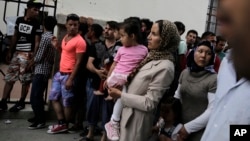A European Union plan to disperse 40,000 migrants from Italy and Greece to other member countries met with resistance Wednesday, with Britain saying it would not participate and some eastern states calling for a voluntary scheme.
Under plans put forward by the executive European Commission, the bloc would also accept 20,000 refugees from outside the 28-nation grouping and share them around EU states.
The scheme is intended to meet calls by Italy and Greece for EU assistance to ease the pressure from migrants reaching their shores. The two countries serve as the main gateway into Europe for migrants from North Africa, Asia and the Middle East, more than 600,000 of whom sought refuge in the EU last year. Thousands of people, mostly from war-torn African and Middle Eastern countries, have died trying to cross the Mediterranean.
But a number of EU governments, many of them under pressure from anti-immigration parties at home, voiced opposition to or strong reservations about the proposals to share out 24,000 asylum-seekers from Italy and 16,000 from Greece. That could mean the proposals will not receive enough backing from EU governments to pass under the bloc's complex voting system.
"It is about action"
"It does seem as if some member states were reluctant, but they have to accept that it is not about words, it is about action," European Commission President Jean-Claude Juncker said at a news conference.
Under the proposals, migrants would be shared out according to each EU country's population, economy and unemployment rate. Germany would take around 22 percent of the migrants from Italy and Greece, or 8,700, while France would take 17 percent, or some 6,700.
Britain's newly elected Conservative government, which wants to reduce immigration, said it would not take part in either scheme. Under special rights it enjoys, Britain can choose whether to participate in EU migration proposals.
There is also opposition to the plan in central and eastern European states. "Compulsory quotas and distribution of refugees regardless of their will are not a sustainable solution of the current migration crisis," Czech Prime Minister Bohuslav Sobotka said in a statement.
Lithuanian Deputy Foreign Minister Rolandas Krisciunas told Reuters that the commission's scheme should be voluntary, not mandatory.
Hungarian Prime Minister Viktor Orban has said the scheme was "bordering on insanity."
One central European diplomat was pessimistic about chances of agreement, saying: "There would be serious consequences for the European project if this was imposed on countries."
Support from Germany
But EU power broker Germany backed the proposal. "You can negotiate the allocation. It won't be easy, but the way is right," Interior Minister Thomas de Maiziere said in Berlin.
France will examine the proposal but believes more work is needed to shape an effective and fair plan, a diplomat said.
Spanish Foreign Minister Jose Manuel Garcia-Margallo said Spain would apply the relocation quotas, if approved, although it would press for a fairer treatment that took account of Spain's high unemployment rate.
U.N. Secretary-General Ban Ki-moon encouraged EU governments to "show compassion" in considering the proposal. He voiced concern about the EU's plan for a military operation to destroy migrant smugglers' ships off Libya, saying this could deprive people of their livelihoods.













